Impact of Social Issues on Indigenous Australian Families
VerifiedAdded on 2022/12/15
|10
|3241
|172
Essay
AI Summary
This essay, prepared for a Master of Social Work course, delves into the multifaceted challenges confronting Indigenous Australians, particularly focusing on the impact of these issues on families. It examines the historical context of disadvantage, including dispossession and discrimination, and their ongoing effects on poverty, education, healthcare, and social inequality. The essay highlights the failures of Australian social policies and the social work practices that have contributed to these issues. The essay also explores the role of social workers in promoting cultural competence, advocating for social justice, and ensuring that Indigenous families receive the necessary support to improve their quality of life. The author emphasizes the need for a shift in social policies and practices to achieve genuine diversity and inclusion, ultimately aiming for a more equitable and just society for Indigenous Australians.
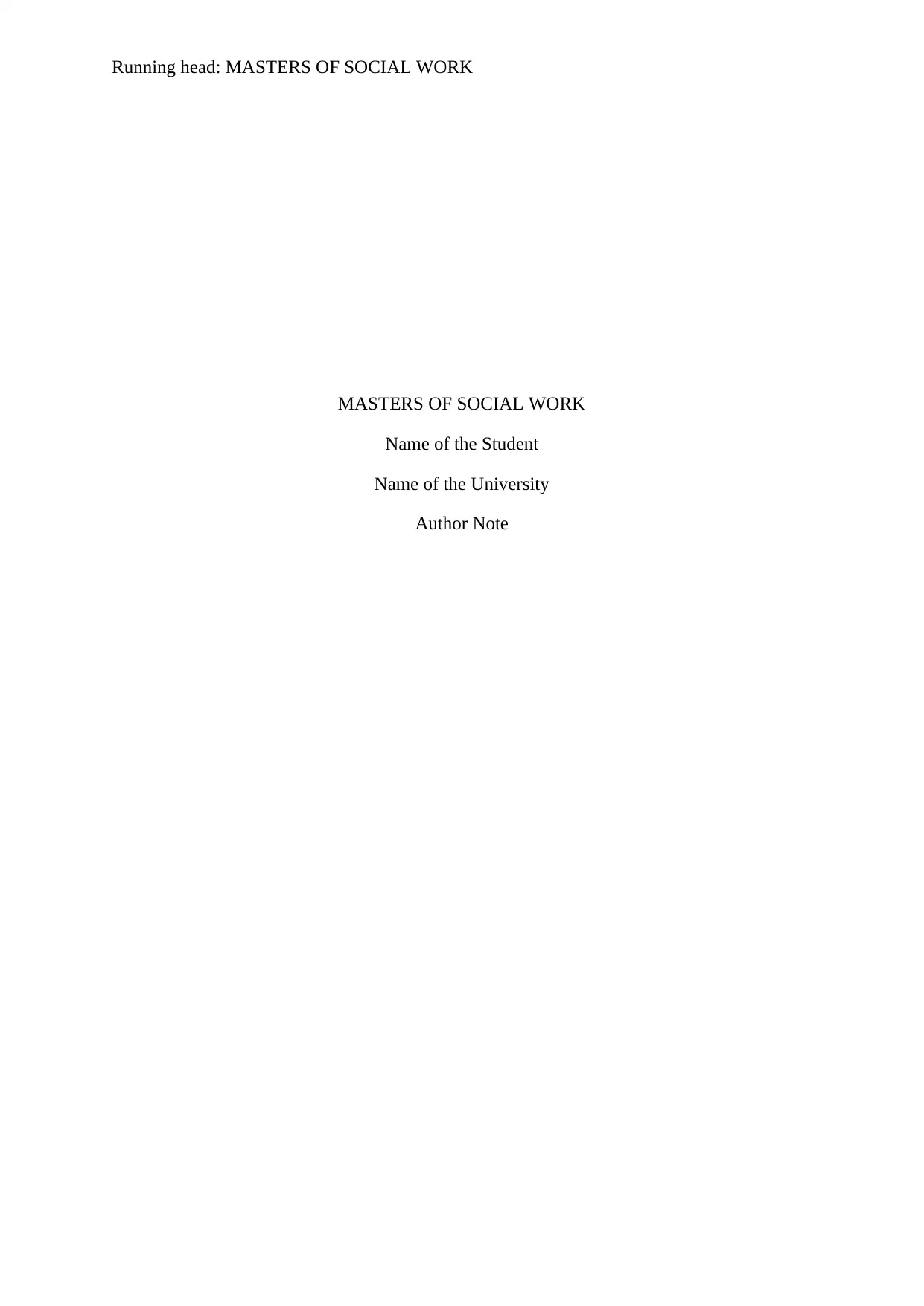
Running head: MASTERS OF SOCIAL WORK
MASTERS OF SOCIAL WORK
Name of the Student
Name of the University
Author Note
MASTERS OF SOCIAL WORK
Name of the Student
Name of the University
Author Note
Paraphrase This Document
Need a fresh take? Get an instant paraphrase of this document with our AI Paraphraser
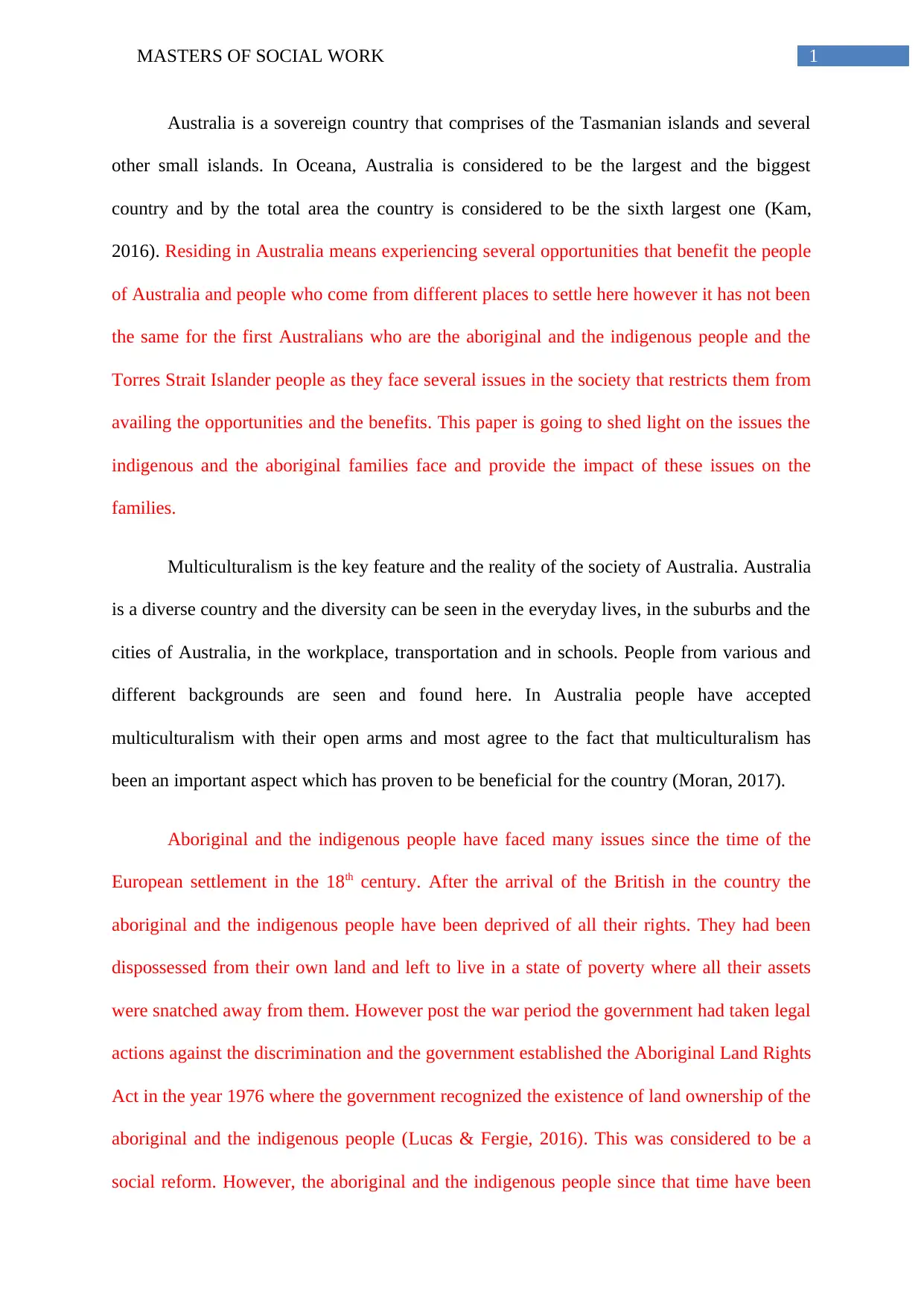
1MASTERS OF SOCIAL WORK
Australia is a sovereign country that comprises of the Tasmanian islands and several
other small islands. In Oceana, Australia is considered to be the largest and the biggest
country and by the total area the country is considered to be the sixth largest one (Kam,
2016). Residing in Australia means experiencing several opportunities that benefit the people
of Australia and people who come from different places to settle here however it has not been
the same for the first Australians who are the aboriginal and the indigenous people and the
Torres Strait Islander people as they face several issues in the society that restricts them from
availing the opportunities and the benefits. This paper is going to shed light on the issues the
indigenous and the aboriginal families face and provide the impact of these issues on the
families.
Multiculturalism is the key feature and the reality of the society of Australia. Australia
is a diverse country and the diversity can be seen in the everyday lives, in the suburbs and the
cities of Australia, in the workplace, transportation and in schools. People from various and
different backgrounds are seen and found here. In Australia people have accepted
multiculturalism with their open arms and most agree to the fact that multiculturalism has
been an important aspect which has proven to be beneficial for the country (Moran, 2017).
Aboriginal and the indigenous people have faced many issues since the time of the
European settlement in the 18th century. After the arrival of the British in the country the
aboriginal and the indigenous people have been deprived of all their rights. They had been
dispossessed from their own land and left to live in a state of poverty where all their assets
were snatched away from them. However post the war period the government had taken legal
actions against the discrimination and the government established the Aboriginal Land Rights
Act in the year 1976 where the government recognized the existence of land ownership of the
aboriginal and the indigenous people (Lucas & Fergie, 2016). This was considered to be a
social reform. However, the aboriginal and the indigenous people since that time have been
Australia is a sovereign country that comprises of the Tasmanian islands and several
other small islands. In Oceana, Australia is considered to be the largest and the biggest
country and by the total area the country is considered to be the sixth largest one (Kam,
2016). Residing in Australia means experiencing several opportunities that benefit the people
of Australia and people who come from different places to settle here however it has not been
the same for the first Australians who are the aboriginal and the indigenous people and the
Torres Strait Islander people as they face several issues in the society that restricts them from
availing the opportunities and the benefits. This paper is going to shed light on the issues the
indigenous and the aboriginal families face and provide the impact of these issues on the
families.
Multiculturalism is the key feature and the reality of the society of Australia. Australia
is a diverse country and the diversity can be seen in the everyday lives, in the suburbs and the
cities of Australia, in the workplace, transportation and in schools. People from various and
different backgrounds are seen and found here. In Australia people have accepted
multiculturalism with their open arms and most agree to the fact that multiculturalism has
been an important aspect which has proven to be beneficial for the country (Moran, 2017).
Aboriginal and the indigenous people have faced many issues since the time of the
European settlement in the 18th century. After the arrival of the British in the country the
aboriginal and the indigenous people have been deprived of all their rights. They had been
dispossessed from their own land and left to live in a state of poverty where all their assets
were snatched away from them. However post the war period the government had taken legal
actions against the discrimination and the government established the Aboriginal Land Rights
Act in the year 1976 where the government recognized the existence of land ownership of the
aboriginal and the indigenous people (Lucas & Fergie, 2016). This was considered to be a
social reform. However, the aboriginal and the indigenous people since that time have been
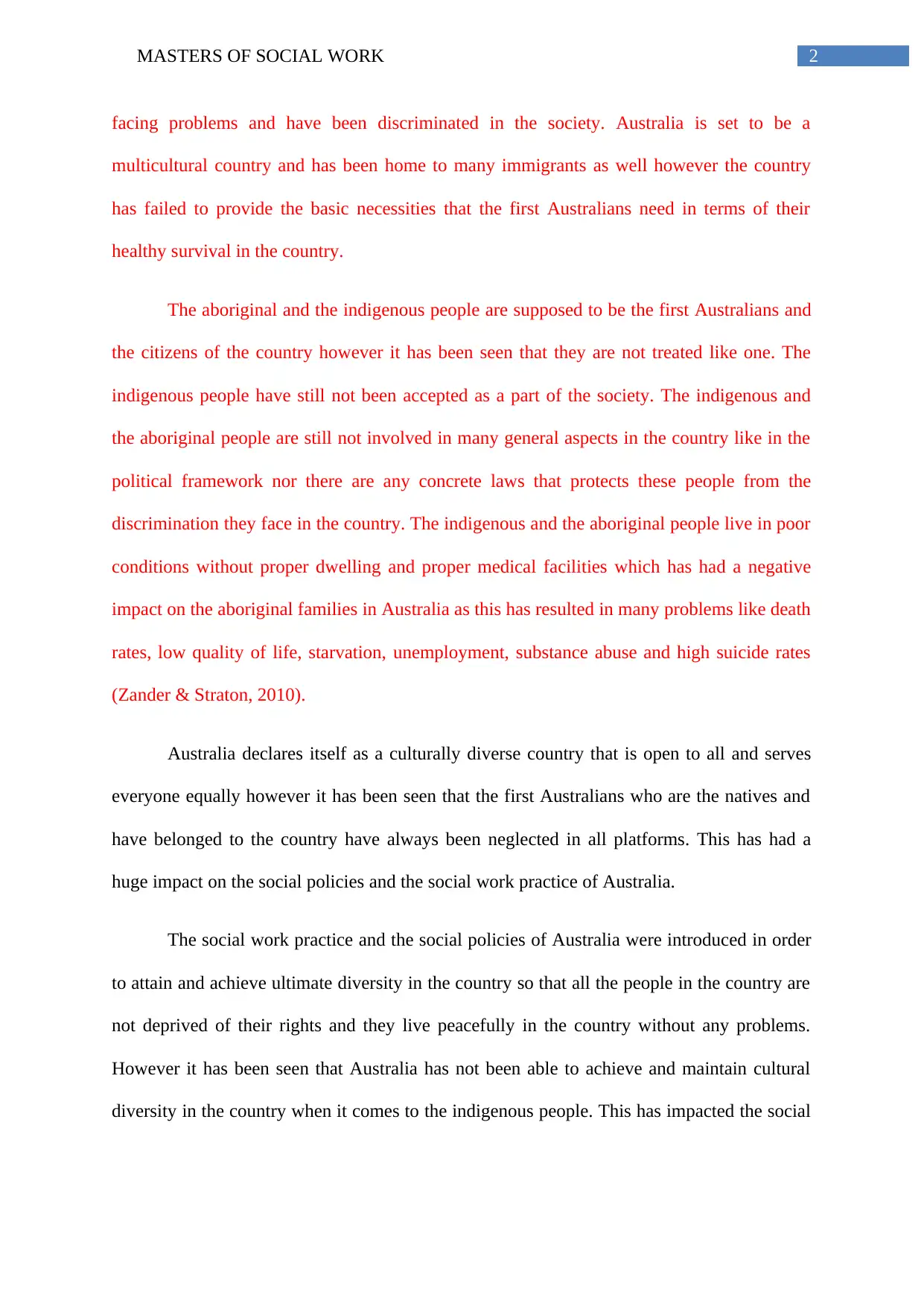
2MASTERS OF SOCIAL WORK
facing problems and have been discriminated in the society. Australia is set to be a
multicultural country and has been home to many immigrants as well however the country
has failed to provide the basic necessities that the first Australians need in terms of their
healthy survival in the country.
The aboriginal and the indigenous people are supposed to be the first Australians and
the citizens of the country however it has been seen that they are not treated like one. The
indigenous people have still not been accepted as a part of the society. The indigenous and
the aboriginal people are still not involved in many general aspects in the country like in the
political framework nor there are any concrete laws that protects these people from the
discrimination they face in the country. The indigenous and the aboriginal people live in poor
conditions without proper dwelling and proper medical facilities which has had a negative
impact on the aboriginal families in Australia as this has resulted in many problems like death
rates, low quality of life, starvation, unemployment, substance abuse and high suicide rates
(Zander & Straton, 2010).
Australia declares itself as a culturally diverse country that is open to all and serves
everyone equally however it has been seen that the first Australians who are the natives and
have belonged to the country have always been neglected in all platforms. This has had a
huge impact on the social policies and the social work practice of Australia.
The social work practice and the social policies of Australia were introduced in order
to attain and achieve ultimate diversity in the country so that all the people in the country are
not deprived of their rights and they live peacefully in the country without any problems.
However it has been seen that Australia has not been able to achieve and maintain cultural
diversity in the country when it comes to the indigenous people. This has impacted the social
facing problems and have been discriminated in the society. Australia is set to be a
multicultural country and has been home to many immigrants as well however the country
has failed to provide the basic necessities that the first Australians need in terms of their
healthy survival in the country.
The aboriginal and the indigenous people are supposed to be the first Australians and
the citizens of the country however it has been seen that they are not treated like one. The
indigenous people have still not been accepted as a part of the society. The indigenous and
the aboriginal people are still not involved in many general aspects in the country like in the
political framework nor there are any concrete laws that protects these people from the
discrimination they face in the country. The indigenous and the aboriginal people live in poor
conditions without proper dwelling and proper medical facilities which has had a negative
impact on the aboriginal families in Australia as this has resulted in many problems like death
rates, low quality of life, starvation, unemployment, substance abuse and high suicide rates
(Zander & Straton, 2010).
Australia declares itself as a culturally diverse country that is open to all and serves
everyone equally however it has been seen that the first Australians who are the natives and
have belonged to the country have always been neglected in all platforms. This has had a
huge impact on the social policies and the social work practice of Australia.
The social work practice and the social policies of Australia were introduced in order
to attain and achieve ultimate diversity in the country so that all the people in the country are
not deprived of their rights and they live peacefully in the country without any problems.
However it has been seen that Australia has not been able to achieve and maintain cultural
diversity in the country when it comes to the indigenous people. This has impacted the social
⊘ This is a preview!⊘
Do you want full access?
Subscribe today to unlock all pages.

Trusted by 1+ million students worldwide
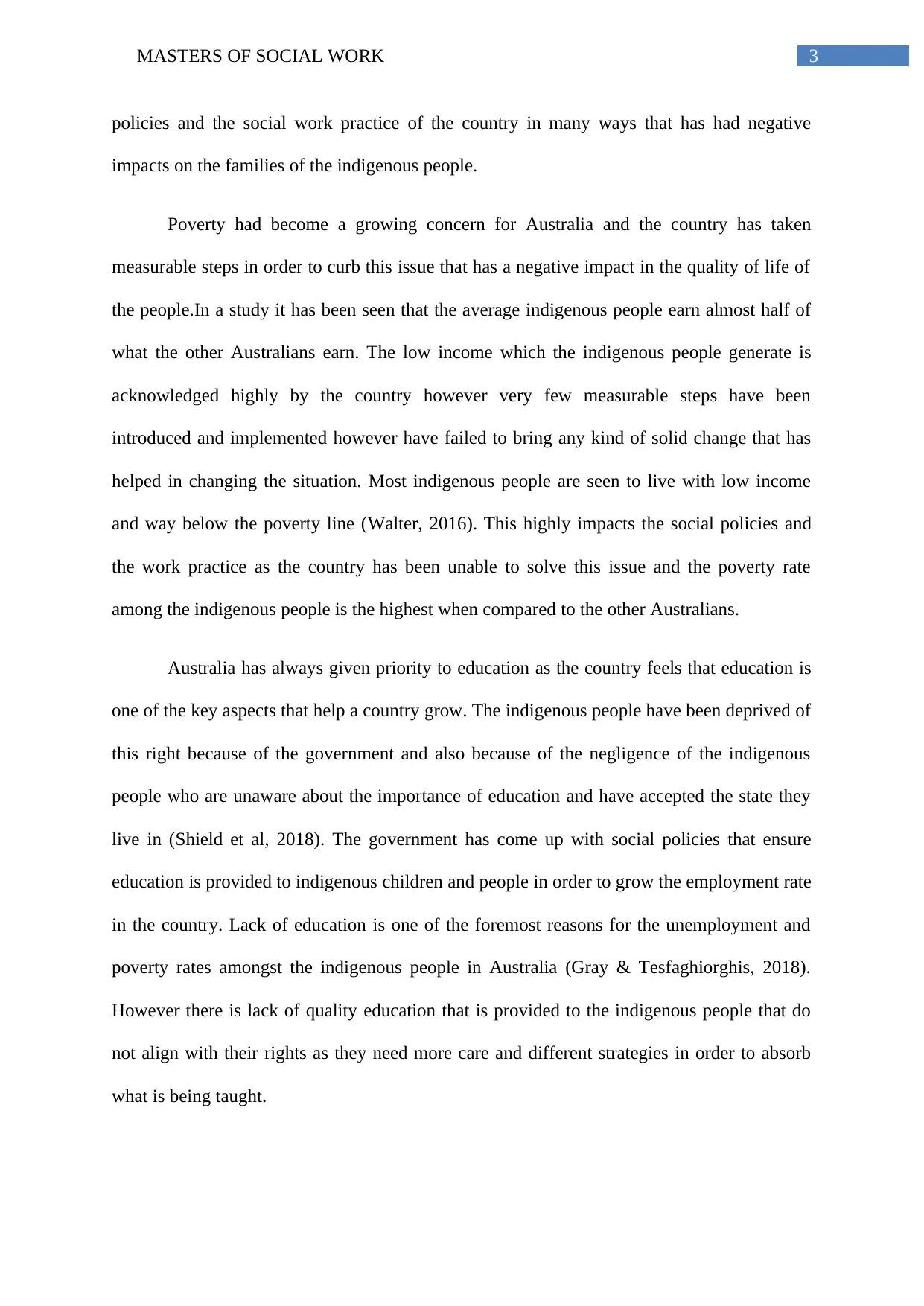
3MASTERS OF SOCIAL WORK
policies and the social work practice of the country in many ways that has had negative
impacts on the families of the indigenous people.
Poverty had become a growing concern for Australia and the country has taken
measurable steps in order to curb this issue that has a negative impact in the quality of life of
the people.In a study it has been seen that the average indigenous people earn almost half of
what the other Australians earn. The low income which the indigenous people generate is
acknowledged highly by the country however very few measurable steps have been
introduced and implemented however have failed to bring any kind of solid change that has
helped in changing the situation. Most indigenous people are seen to live with low income
and way below the poverty line (Walter, 2016). This highly impacts the social policies and
the work practice as the country has been unable to solve this issue and the poverty rate
among the indigenous people is the highest when compared to the other Australians.
Australia has always given priority to education as the country feels that education is
one of the key aspects that help a country grow. The indigenous people have been deprived of
this right because of the government and also because of the negligence of the indigenous
people who are unaware about the importance of education and have accepted the state they
live in (Shield et al, 2018). The government has come up with social policies that ensure
education is provided to indigenous children and people in order to grow the employment rate
in the country. Lack of education is one of the foremost reasons for the unemployment and
poverty rates amongst the indigenous people in Australia (Gray & Tesfaghiorghis, 2018).
However there is lack of quality education that is provided to the indigenous people that do
not align with their rights as they need more care and different strategies in order to absorb
what is being taught.
policies and the social work practice of the country in many ways that has had negative
impacts on the families of the indigenous people.
Poverty had become a growing concern for Australia and the country has taken
measurable steps in order to curb this issue that has a negative impact in the quality of life of
the people.In a study it has been seen that the average indigenous people earn almost half of
what the other Australians earn. The low income which the indigenous people generate is
acknowledged highly by the country however very few measurable steps have been
introduced and implemented however have failed to bring any kind of solid change that has
helped in changing the situation. Most indigenous people are seen to live with low income
and way below the poverty line (Walter, 2016). This highly impacts the social policies and
the work practice as the country has been unable to solve this issue and the poverty rate
among the indigenous people is the highest when compared to the other Australians.
Australia has always given priority to education as the country feels that education is
one of the key aspects that help a country grow. The indigenous people have been deprived of
this right because of the government and also because of the negligence of the indigenous
people who are unaware about the importance of education and have accepted the state they
live in (Shield et al, 2018). The government has come up with social policies that ensure
education is provided to indigenous children and people in order to grow the employment rate
in the country. Lack of education is one of the foremost reasons for the unemployment and
poverty rates amongst the indigenous people in Australia (Gray & Tesfaghiorghis, 2018).
However there is lack of quality education that is provided to the indigenous people that do
not align with their rights as they need more care and different strategies in order to absorb
what is being taught.
Paraphrase This Document
Need a fresh take? Get an instant paraphrase of this document with our AI Paraphraser
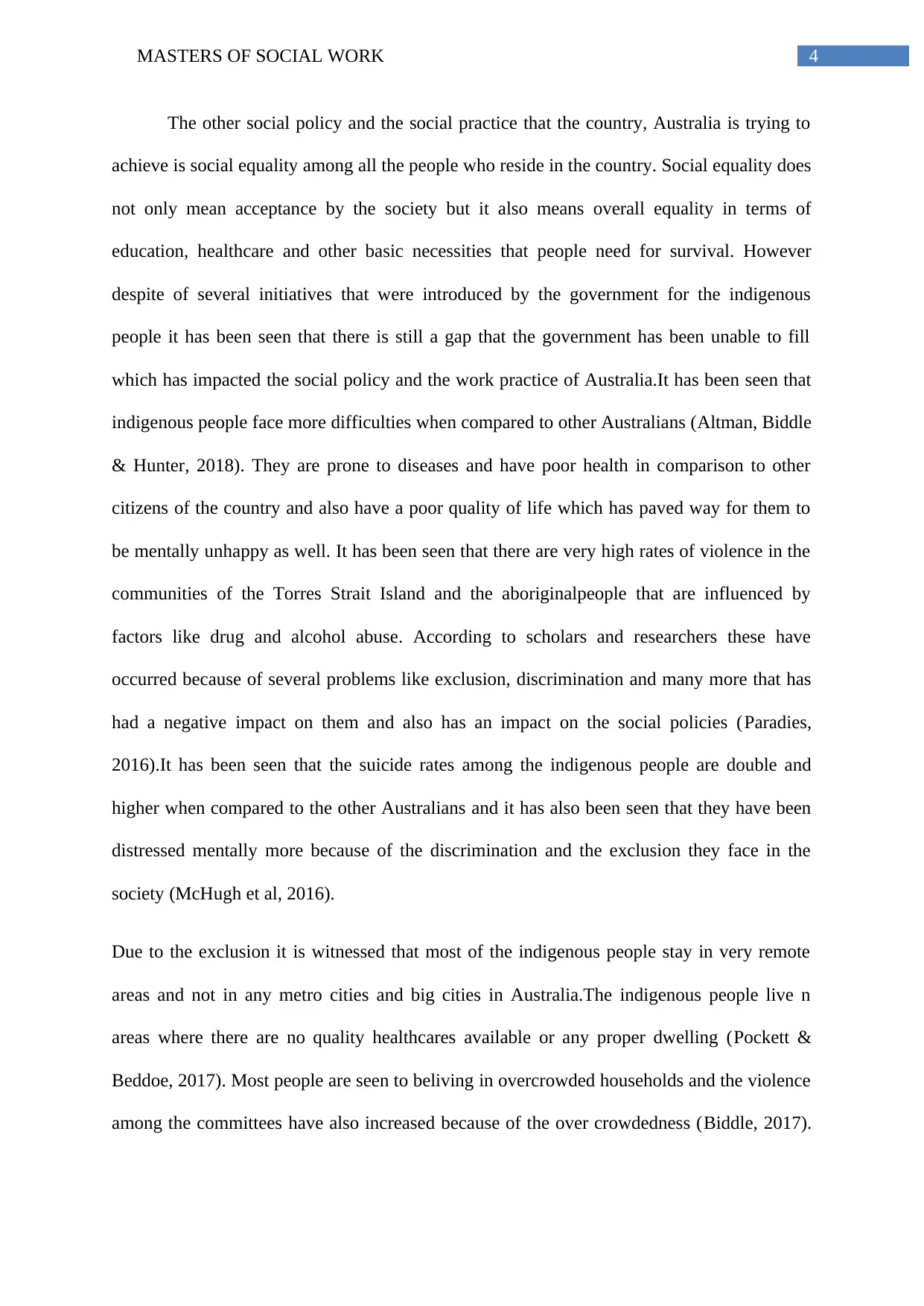
4MASTERS OF SOCIAL WORK
The other social policy and the social practice that the country, Australia is trying to
achieve is social equality among all the people who reside in the country. Social equality does
not only mean acceptance by the society but it also means overall equality in terms of
education, healthcare and other basic necessities that people need for survival. However
despite of several initiatives that were introduced by the government for the indigenous
people it has been seen that there is still a gap that the government has been unable to fill
which has impacted the social policy and the work practice of Australia.It has been seen that
indigenous people face more difficulties when compared to other Australians (Altman, Biddle
& Hunter, 2018). They are prone to diseases and have poor health in comparison to other
citizens of the country and also have a poor quality of life which has paved way for them to
be mentally unhappy as well. It has been seen that there are very high rates of violence in the
communities of the Torres Strait Island and the aboriginalpeople that are influenced by
factors like drug and alcohol abuse. According to scholars and researchers these have
occurred because of several problems like exclusion, discrimination and many more that has
had a negative impact on them and also has an impact on the social policies (Paradies,
2016).It has been seen that the suicide rates among the indigenous people are double and
higher when compared to the other Australians and it has also been seen that they have been
distressed mentally more because of the discrimination and the exclusion they face in the
society (McHugh et al, 2016).
Due to the exclusion it is witnessed that most of the indigenous people stay in very remote
areas and not in any metro cities and big cities in Australia.The indigenous people live n
areas where there are no quality healthcares available or any proper dwelling (Pockett &
Beddoe, 2017). Most people are seen to beliving in overcrowded households and the violence
among the committees have also increased because of the over crowdedness (Biddle, 2017).
The other social policy and the social practice that the country, Australia is trying to
achieve is social equality among all the people who reside in the country. Social equality does
not only mean acceptance by the society but it also means overall equality in terms of
education, healthcare and other basic necessities that people need for survival. However
despite of several initiatives that were introduced by the government for the indigenous
people it has been seen that there is still a gap that the government has been unable to fill
which has impacted the social policy and the work practice of Australia.It has been seen that
indigenous people face more difficulties when compared to other Australians (Altman, Biddle
& Hunter, 2018). They are prone to diseases and have poor health in comparison to other
citizens of the country and also have a poor quality of life which has paved way for them to
be mentally unhappy as well. It has been seen that there are very high rates of violence in the
communities of the Torres Strait Island and the aboriginalpeople that are influenced by
factors like drug and alcohol abuse. According to scholars and researchers these have
occurred because of several problems like exclusion, discrimination and many more that has
had a negative impact on them and also has an impact on the social policies (Paradies,
2016).It has been seen that the suicide rates among the indigenous people are double and
higher when compared to the other Australians and it has also been seen that they have been
distressed mentally more because of the discrimination and the exclusion they face in the
society (McHugh et al, 2016).
Due to the exclusion it is witnessed that most of the indigenous people stay in very remote
areas and not in any metro cities and big cities in Australia.The indigenous people live n
areas where there are no quality healthcares available or any proper dwelling (Pockett &
Beddoe, 2017). Most people are seen to beliving in overcrowded households and the violence
among the committees have also increased because of the over crowdedness (Biddle, 2017).
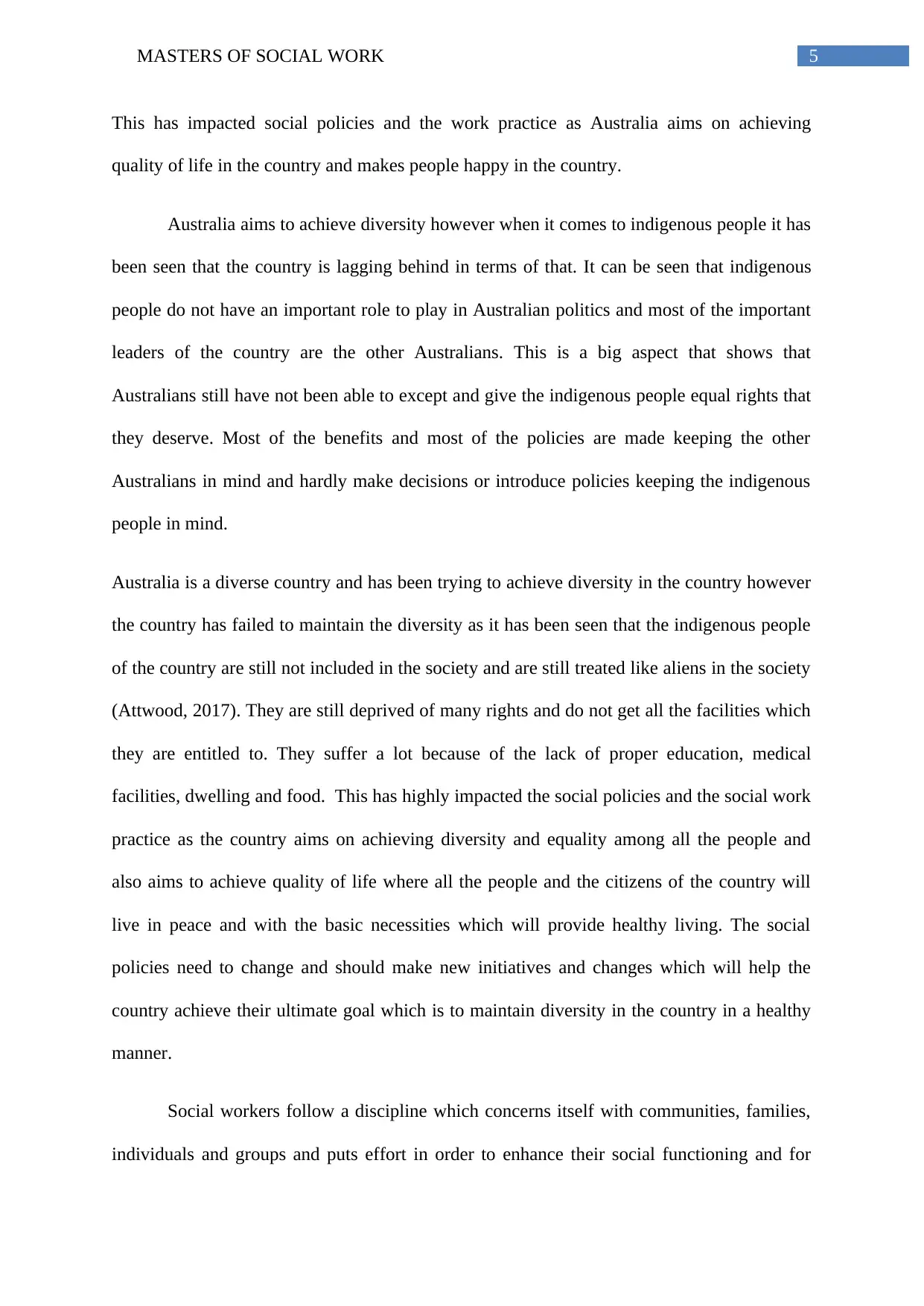
5MASTERS OF SOCIAL WORK
This has impacted social policies and the work practice as Australia aims on achieving
quality of life in the country and makes people happy in the country.
Australia aims to achieve diversity however when it comes to indigenous people it has
been seen that the country is lagging behind in terms of that. It can be seen that indigenous
people do not have an important role to play in Australian politics and most of the important
leaders of the country are the other Australians. This is a big aspect that shows that
Australians still have not been able to except and give the indigenous people equal rights that
they deserve. Most of the benefits and most of the policies are made keeping the other
Australians in mind and hardly make decisions or introduce policies keeping the indigenous
people in mind.
Australia is a diverse country and has been trying to achieve diversity in the country however
the country has failed to maintain the diversity as it has been seen that the indigenous people
of the country are still not included in the society and are still treated like aliens in the society
(Attwood, 2017). They are still deprived of many rights and do not get all the facilities which
they are entitled to. They suffer a lot because of the lack of proper education, medical
facilities, dwelling and food. This has highly impacted the social policies and the social work
practice as the country aims on achieving diversity and equality among all the people and
also aims to achieve quality of life where all the people and the citizens of the country will
live in peace and with the basic necessities which will provide healthy living. The social
policies need to change and should make new initiatives and changes which will help the
country achieve their ultimate goal which is to maintain diversity in the country in a healthy
manner.
Social workers follow a discipline which concerns itself with communities, families,
individuals and groups and puts effort in order to enhance their social functioning and for
This has impacted social policies and the work practice as Australia aims on achieving
quality of life in the country and makes people happy in the country.
Australia aims to achieve diversity however when it comes to indigenous people it has
been seen that the country is lagging behind in terms of that. It can be seen that indigenous
people do not have an important role to play in Australian politics and most of the important
leaders of the country are the other Australians. This is a big aspect that shows that
Australians still have not been able to except and give the indigenous people equal rights that
they deserve. Most of the benefits and most of the policies are made keeping the other
Australians in mind and hardly make decisions or introduce policies keeping the indigenous
people in mind.
Australia is a diverse country and has been trying to achieve diversity in the country however
the country has failed to maintain the diversity as it has been seen that the indigenous people
of the country are still not included in the society and are still treated like aliens in the society
(Attwood, 2017). They are still deprived of many rights and do not get all the facilities which
they are entitled to. They suffer a lot because of the lack of proper education, medical
facilities, dwelling and food. This has highly impacted the social policies and the social work
practice as the country aims on achieving diversity and equality among all the people and
also aims to achieve quality of life where all the people and the citizens of the country will
live in peace and with the basic necessities which will provide healthy living. The social
policies need to change and should make new initiatives and changes which will help the
country achieve their ultimate goal which is to maintain diversity in the country in a healthy
manner.
Social workers follow a discipline which concerns itself with communities, families,
individuals and groups and puts effort in order to enhance their social functioning and for
⊘ This is a preview!⊘
Do you want full access?
Subscribe today to unlock all pages.

Trusted by 1+ million students worldwide
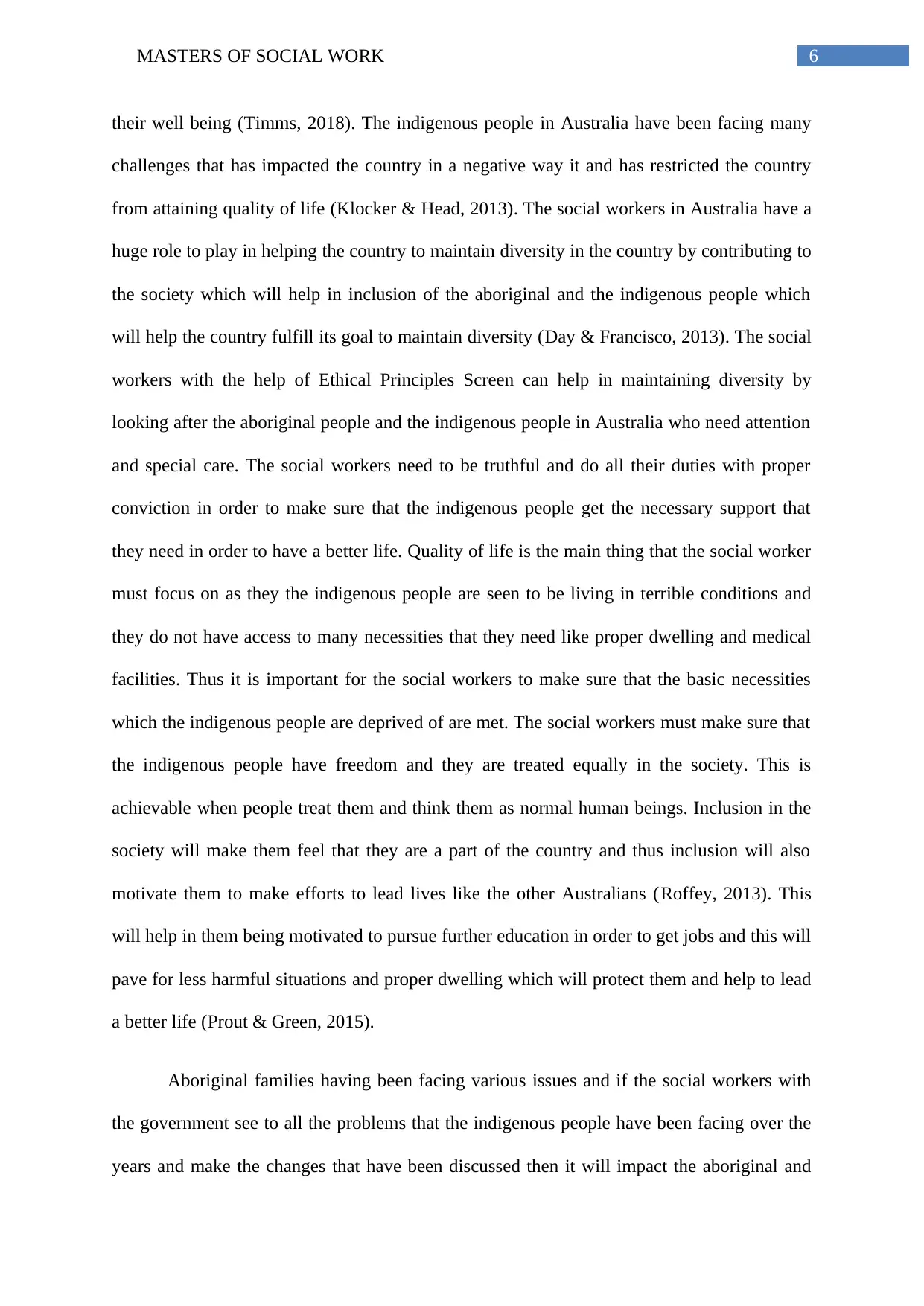
6MASTERS OF SOCIAL WORK
their well being (Timms, 2018). The indigenous people in Australia have been facing many
challenges that has impacted the country in a negative way it and has restricted the country
from attaining quality of life (Klocker & Head, 2013). The social workers in Australia have a
huge role to play in helping the country to maintain diversity in the country by contributing to
the society which will help in inclusion of the aboriginal and the indigenous people which
will help the country fulfill its goal to maintain diversity (Day & Francisco, 2013). The social
workers with the help of Ethical Principles Screen can help in maintaining diversity by
looking after the aboriginal people and the indigenous people in Australia who need attention
and special care. The social workers need to be truthful and do all their duties with proper
conviction in order to make sure that the indigenous people get the necessary support that
they need in order to have a better life. Quality of life is the main thing that the social worker
must focus on as they the indigenous people are seen to be living in terrible conditions and
they do not have access to many necessities that they need like proper dwelling and medical
facilities. Thus it is important for the social workers to make sure that the basic necessities
which the indigenous people are deprived of are met. The social workers must make sure that
the indigenous people have freedom and they are treated equally in the society. This is
achievable when people treat them and think them as normal human beings. Inclusion in the
society will make them feel that they are a part of the country and thus inclusion will also
motivate them to make efforts to lead lives like the other Australians (Roffey, 2013). This
will help in them being motivated to pursue further education in order to get jobs and this will
pave for less harmful situations and proper dwelling which will protect them and help to lead
a better life (Prout & Green, 2015).
Aboriginal families having been facing various issues and if the social workers with
the government see to all the problems that the indigenous people have been facing over the
years and make the changes that have been discussed then it will impact the aboriginal and
their well being (Timms, 2018). The indigenous people in Australia have been facing many
challenges that has impacted the country in a negative way it and has restricted the country
from attaining quality of life (Klocker & Head, 2013). The social workers in Australia have a
huge role to play in helping the country to maintain diversity in the country by contributing to
the society which will help in inclusion of the aboriginal and the indigenous people which
will help the country fulfill its goal to maintain diversity (Day & Francisco, 2013). The social
workers with the help of Ethical Principles Screen can help in maintaining diversity by
looking after the aboriginal people and the indigenous people in Australia who need attention
and special care. The social workers need to be truthful and do all their duties with proper
conviction in order to make sure that the indigenous people get the necessary support that
they need in order to have a better life. Quality of life is the main thing that the social worker
must focus on as they the indigenous people are seen to be living in terrible conditions and
they do not have access to many necessities that they need like proper dwelling and medical
facilities. Thus it is important for the social workers to make sure that the basic necessities
which the indigenous people are deprived of are met. The social workers must make sure that
the indigenous people have freedom and they are treated equally in the society. This is
achievable when people treat them and think them as normal human beings. Inclusion in the
society will make them feel that they are a part of the country and thus inclusion will also
motivate them to make efforts to lead lives like the other Australians (Roffey, 2013). This
will help in them being motivated to pursue further education in order to get jobs and this will
pave for less harmful situations and proper dwelling which will protect them and help to lead
a better life (Prout & Green, 2015).
Aboriginal families having been facing various issues and if the social workers with
the government see to all the problems that the indigenous people have been facing over the
years and make the changes that have been discussed then it will impact the aboriginal and
Paraphrase This Document
Need a fresh take? Get an instant paraphrase of this document with our AI Paraphraser
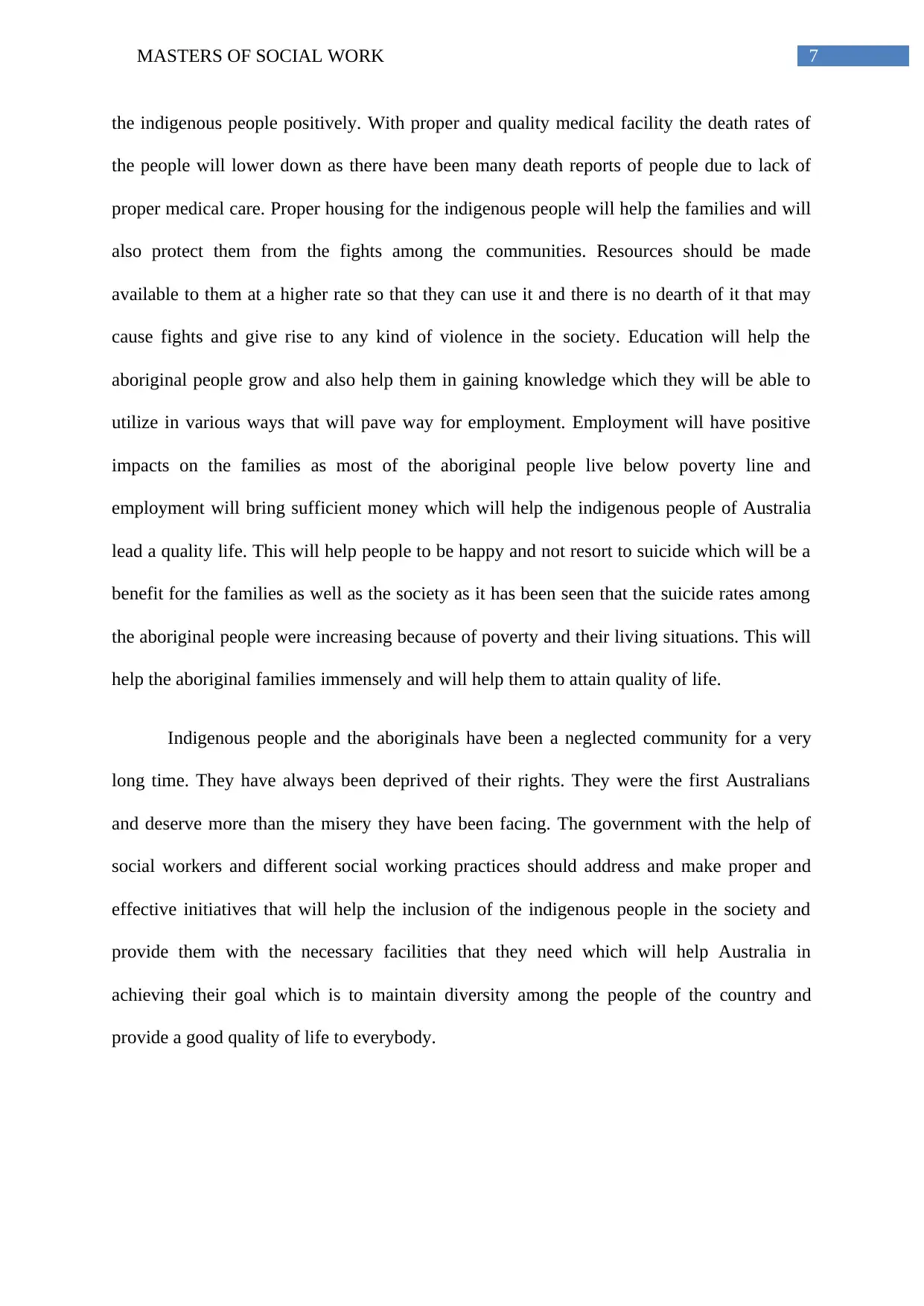
7MASTERS OF SOCIAL WORK
the indigenous people positively. With proper and quality medical facility the death rates of
the people will lower down as there have been many death reports of people due to lack of
proper medical care. Proper housing for the indigenous people will help the families and will
also protect them from the fights among the communities. Resources should be made
available to them at a higher rate so that they can use it and there is no dearth of it that may
cause fights and give rise to any kind of violence in the society. Education will help the
aboriginal people grow and also help them in gaining knowledge which they will be able to
utilize in various ways that will pave way for employment. Employment will have positive
impacts on the families as most of the aboriginal people live below poverty line and
employment will bring sufficient money which will help the indigenous people of Australia
lead a quality life. This will help people to be happy and not resort to suicide which will be a
benefit for the families as well as the society as it has been seen that the suicide rates among
the aboriginal people were increasing because of poverty and their living situations. This will
help the aboriginal families immensely and will help them to attain quality of life.
Indigenous people and the aboriginals have been a neglected community for a very
long time. They have always been deprived of their rights. They were the first Australians
and deserve more than the misery they have been facing. The government with the help of
social workers and different social working practices should address and make proper and
effective initiatives that will help the inclusion of the indigenous people in the society and
provide them with the necessary facilities that they need which will help Australia in
achieving their goal which is to maintain diversity among the people of the country and
provide a good quality of life to everybody.
the indigenous people positively. With proper and quality medical facility the death rates of
the people will lower down as there have been many death reports of people due to lack of
proper medical care. Proper housing for the indigenous people will help the families and will
also protect them from the fights among the communities. Resources should be made
available to them at a higher rate so that they can use it and there is no dearth of it that may
cause fights and give rise to any kind of violence in the society. Education will help the
aboriginal people grow and also help them in gaining knowledge which they will be able to
utilize in various ways that will pave way for employment. Employment will have positive
impacts on the families as most of the aboriginal people live below poverty line and
employment will bring sufficient money which will help the indigenous people of Australia
lead a quality life. This will help people to be happy and not resort to suicide which will be a
benefit for the families as well as the society as it has been seen that the suicide rates among
the aboriginal people were increasing because of poverty and their living situations. This will
help the aboriginal families immensely and will help them to attain quality of life.
Indigenous people and the aboriginals have been a neglected community for a very
long time. They have always been deprived of their rights. They were the first Australians
and deserve more than the misery they have been facing. The government with the help of
social workers and different social working practices should address and make proper and
effective initiatives that will help the inclusion of the indigenous people in the society and
provide them with the necessary facilities that they need which will help Australia in
achieving their goal which is to maintain diversity among the people of the country and
provide a good quality of life to everybody.
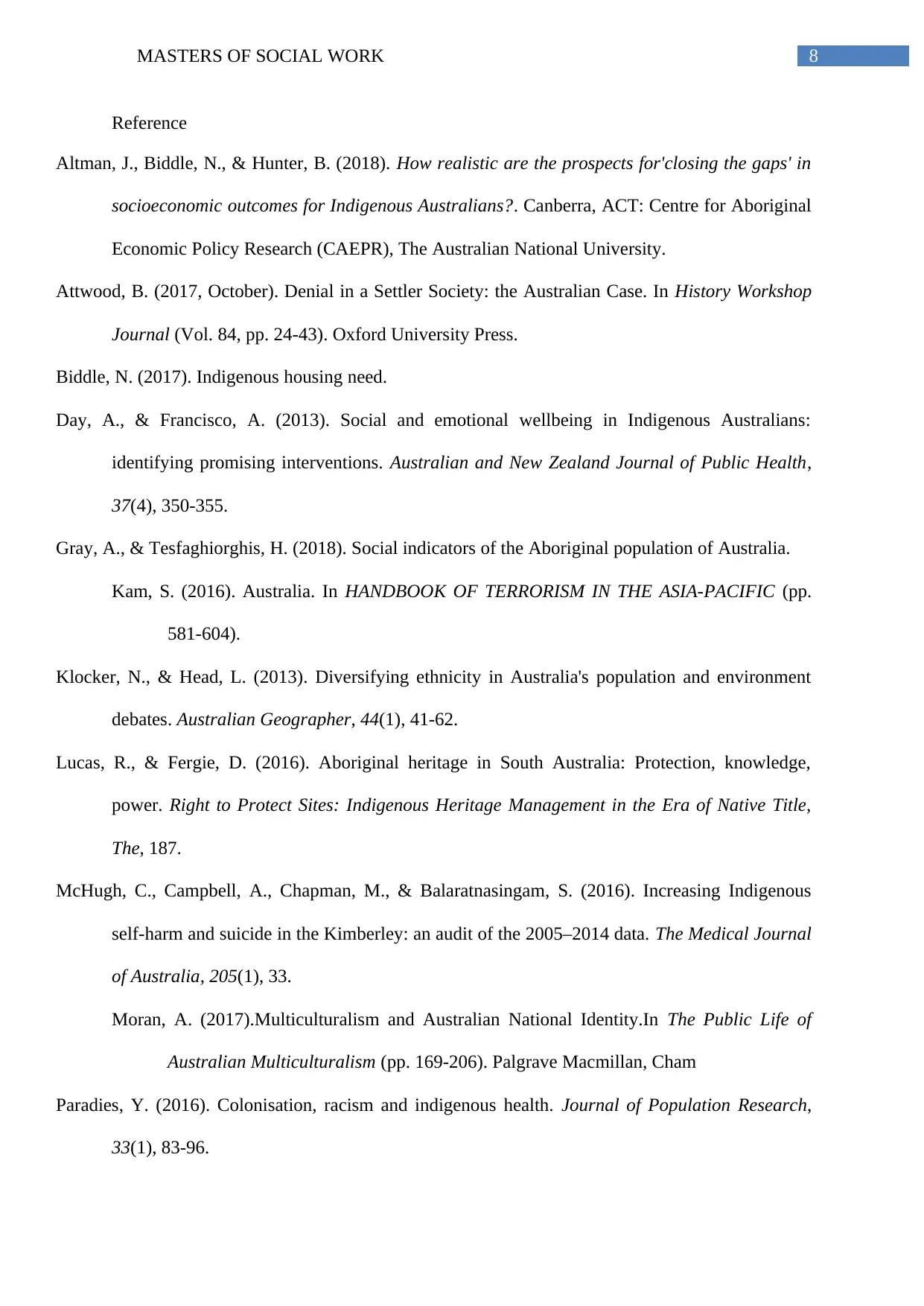
8MASTERS OF SOCIAL WORK
Reference
Altman, J., Biddle, N., & Hunter, B. (2018). How realistic are the prospects for'closing the gaps' in
socioeconomic outcomes for Indigenous Australians?. Canberra, ACT: Centre for Aboriginal
Economic Policy Research (CAEPR), The Australian National University.
Attwood, B. (2017, October). Denial in a Settler Society: the Australian Case. In History Workshop
Journal (Vol. 84, pp. 24-43). Oxford University Press.
Biddle, N. (2017). Indigenous housing need.
Day, A., & Francisco, A. (2013). Social and emotional wellbeing in Indigenous Australians:
identifying promising interventions. Australian and New Zealand Journal of Public Health,
37(4), 350-355.
Gray, A., & Tesfaghiorghis, H. (2018). Social indicators of the Aboriginal population of Australia.
Kam, S. (2016). Australia. In HANDBOOK OF TERRORISM IN THE ASIA-PACIFIC (pp.
581-604).
Klocker, N., & Head, L. (2013). Diversifying ethnicity in Australia's population and environment
debates. Australian Geographer, 44(1), 41-62.
Lucas, R., & Fergie, D. (2016). Aboriginal heritage in South Australia: Protection, knowledge,
power. Right to Protect Sites: Indigenous Heritage Management in the Era of Native Title,
The, 187.
McHugh, C., Campbell, A., Chapman, M., & Balaratnasingam, S. (2016). Increasing Indigenous
self-harm and suicide in the Kimberley: an audit of the 2005–2014 data. The Medical Journal
of Australia, 205(1), 33.
Moran, A. (2017).Multiculturalism and Australian National Identity.In The Public Life of
Australian Multiculturalism (pp. 169-206). Palgrave Macmillan, Cham
Paradies, Y. (2016). Colonisation, racism and indigenous health. Journal of Population Research,
33(1), 83-96.
Reference
Altman, J., Biddle, N., & Hunter, B. (2018). How realistic are the prospects for'closing the gaps' in
socioeconomic outcomes for Indigenous Australians?. Canberra, ACT: Centre for Aboriginal
Economic Policy Research (CAEPR), The Australian National University.
Attwood, B. (2017, October). Denial in a Settler Society: the Australian Case. In History Workshop
Journal (Vol. 84, pp. 24-43). Oxford University Press.
Biddle, N. (2017). Indigenous housing need.
Day, A., & Francisco, A. (2013). Social and emotional wellbeing in Indigenous Australians:
identifying promising interventions. Australian and New Zealand Journal of Public Health,
37(4), 350-355.
Gray, A., & Tesfaghiorghis, H. (2018). Social indicators of the Aboriginal population of Australia.
Kam, S. (2016). Australia. In HANDBOOK OF TERRORISM IN THE ASIA-PACIFIC (pp.
581-604).
Klocker, N., & Head, L. (2013). Diversifying ethnicity in Australia's population and environment
debates. Australian Geographer, 44(1), 41-62.
Lucas, R., & Fergie, D. (2016). Aboriginal heritage in South Australia: Protection, knowledge,
power. Right to Protect Sites: Indigenous Heritage Management in the Era of Native Title,
The, 187.
McHugh, C., Campbell, A., Chapman, M., & Balaratnasingam, S. (2016). Increasing Indigenous
self-harm and suicide in the Kimberley: an audit of the 2005–2014 data. The Medical Journal
of Australia, 205(1), 33.
Moran, A. (2017).Multiculturalism and Australian National Identity.In The Public Life of
Australian Multiculturalism (pp. 169-206). Palgrave Macmillan, Cham
Paradies, Y. (2016). Colonisation, racism and indigenous health. Journal of Population Research,
33(1), 83-96.
⊘ This is a preview!⊘
Do you want full access?
Subscribe today to unlock all pages.

Trusted by 1+ million students worldwide
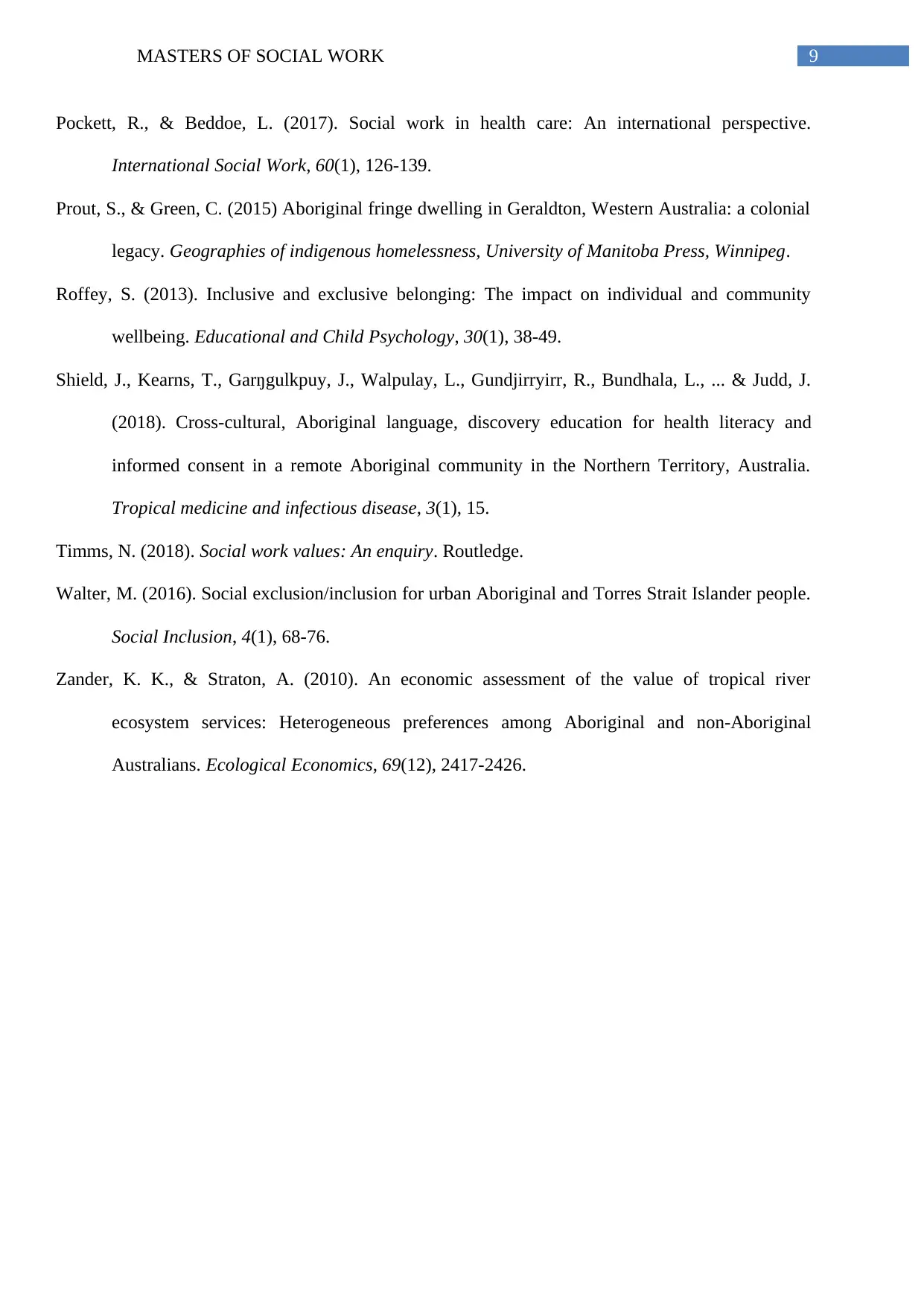
9MASTERS OF SOCIAL WORK
Pockett, R., & Beddoe, L. (2017). Social work in health care: An international perspective.
International Social Work, 60(1), 126-139.
Prout, S., & Green, C. (2015) Aboriginal fringe dwelling in Geraldton, Western Australia: a colonial
legacy. Geographies of indigenous homelessness, University of Manitoba Press, Winnipeg.
Roffey, S. (2013). Inclusive and exclusive belonging: The impact on individual and community
wellbeing. Educational and Child Psychology, 30(1), 38-49.
Shield, J., Kearns, T., Garŋgulkpuy, J., Walpulay, L., Gundjirryirr, R., Bundhala, L., ... & Judd, J.
(2018). Cross-cultural, Aboriginal language, discovery education for health literacy and
informed consent in a remote Aboriginal community in the Northern Territory, Australia.
Tropical medicine and infectious disease, 3(1), 15.
Timms, N. (2018). Social work values: An enquiry. Routledge.
Walter, M. (2016). Social exclusion/inclusion for urban Aboriginal and Torres Strait Islander people.
Social Inclusion, 4(1), 68-76.
Zander, K. K., & Straton, A. (2010). An economic assessment of the value of tropical river
ecosystem services: Heterogeneous preferences among Aboriginal and non-Aboriginal
Australians. Ecological Economics, 69(12), 2417-2426.
Pockett, R., & Beddoe, L. (2017). Social work in health care: An international perspective.
International Social Work, 60(1), 126-139.
Prout, S., & Green, C. (2015) Aboriginal fringe dwelling in Geraldton, Western Australia: a colonial
legacy. Geographies of indigenous homelessness, University of Manitoba Press, Winnipeg.
Roffey, S. (2013). Inclusive and exclusive belonging: The impact on individual and community
wellbeing. Educational and Child Psychology, 30(1), 38-49.
Shield, J., Kearns, T., Garŋgulkpuy, J., Walpulay, L., Gundjirryirr, R., Bundhala, L., ... & Judd, J.
(2018). Cross-cultural, Aboriginal language, discovery education for health literacy and
informed consent in a remote Aboriginal community in the Northern Territory, Australia.
Tropical medicine and infectious disease, 3(1), 15.
Timms, N. (2018). Social work values: An enquiry. Routledge.
Walter, M. (2016). Social exclusion/inclusion for urban Aboriginal and Torres Strait Islander people.
Social Inclusion, 4(1), 68-76.
Zander, K. K., & Straton, A. (2010). An economic assessment of the value of tropical river
ecosystem services: Heterogeneous preferences among Aboriginal and non-Aboriginal
Australians. Ecological Economics, 69(12), 2417-2426.
1 out of 10
Related Documents
Your All-in-One AI-Powered Toolkit for Academic Success.
+13062052269
info@desklib.com
Available 24*7 on WhatsApp / Email
![[object Object]](/_next/static/media/star-bottom.7253800d.svg)
Unlock your academic potential
Copyright © 2020–2025 A2Z Services. All Rights Reserved. Developed and managed by ZUCOL.





